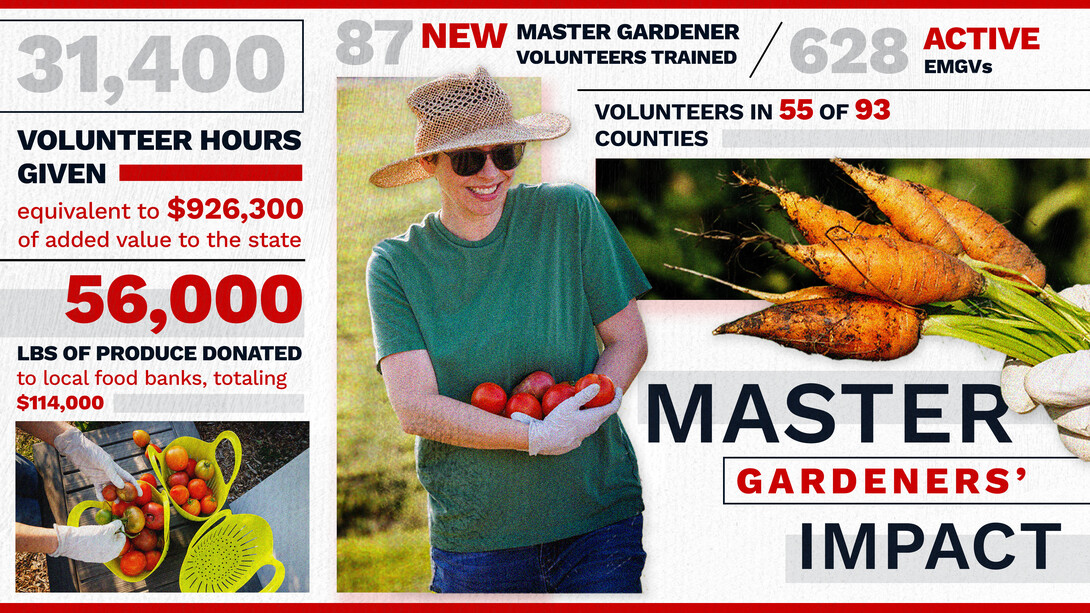
By Deann Gayman | University Communication and Marketing
Since 1976, trained volunteers have been fanned out across Nebraska to help educate their communities on best practices for horticulture — from how to remove aphids to how to get the most out of watering your lawn.
They’re known as master gardener volunteers, and they earn their expertise through Nebraska Extension’s Master Gardener Volunteer Program.
Currently, there are about 700 volunteers in 55 counties, but communities utilize them in all 93 counties. Whether keeping community gardens going, greening up parks and trails, or answering phone calls to give research-based guidance, the volunteers impact the entire state, by expanding Extension's outreach and education efforts.
“Everybody has a landscape, whether it’s a couple of flowerpots on your apartment balcony, a local park or your backyard,” said Terri James, Extension educator and program coordinator. “Horticulture and landscapes are a great connector. We teach EMGVs science- and research-based landscape systems information, which they take back to their communities.”
Each master gardener volunteer completes 40 hours of education and 40 hours of volunteer activities in the initial year of their program, when they’re in intern status. In subsequent years, they complete a minimum of 10 hours of continuing education and 20 volunteer hours per year. Volunteer hours can be completed in a variety of ways, James said — the only requirements are they have a community connection and educational component.
The efforts are a boon for the state. In 2023 alone, the volunteers clocked 31,400 volunteer hours and connected with 258,000 Nebraska residents. Additionally, their efforts added 56,000 pounds of fresh produce to local food banks, with a retail value of $111,400.
Some volunteers give time fielding questions from the public in their local Extension office. For example, in the Douglas-Sarpy County Extension Office, they have fielded more than 1,600 phone calls so far in 2024.
And the perennial “Backyard Farmer” television program benefits from the Master Gardener Volunteer Program, too. The Backyard Farmer Garden is managed by the volunteers, alongside staff and faculty.
Elaine Pile, who has been a program volunteer since 2000 and lives in Gering, organizes a team each year to record public service announcements. The announcements are then shared with radio stations, newspapers and social media across the Panhandle and eastern Wyoming. The topic of the announcements is up to the volunteer recording it — everyone has their own unique interests, Pile said.
The program is malleable to those interests intentionally, James said.
“It can depend on what they’re comfortable with and the location they’re at,” James said. “There are some who are comfortable giving a presentation or giving a lesson, or answering the phone, and others aren’t. Others are more comfortable setting up a garden or working with a school or church to do a landscaping project. That’s what’s good about this program — there’s a little bit of everything.”
For Pile, her interests are varied, but that’s part of the fun for her, and one of the reasons she’s continued with the program for 24 years.
“It’s a constant learning process,” she said. “Each year we learn, and that’s one of the things I tell people. I’ve been involved long enough to see how the research has changed through the years, how we keep learning more.”
It’s also about community connection.
“I’ve built up friendships in the group, and met people across the state,” Pile said. “And I’ve worked with a lot of Extension people who’ve really taught me a lot. The expertise we have at our fingertips, no matter what the problem is, there’s somebody there.”
Anyone can become a master gardener volunteer, and applications will be open for the next cohort training soon. For more information about the program and to apply, visit the Nebraska Extension Master Gardener Volunteer Program’s website.
More details at: https://go.unl.edu/zeg9